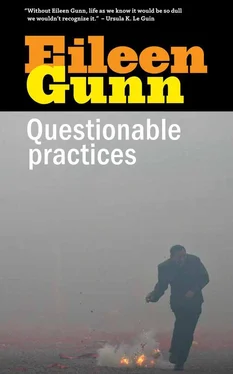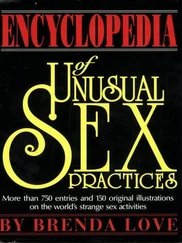Eileen Gunn - Questionable Practices
Здесь есть возможность читать онлайн «Eileen Gunn - Questionable Practices» весь текст электронной книги совершенно бесплатно (целиком полную версию без сокращений). В некоторых случаях можно слушать аудио, скачать через торрент в формате fb2 и присутствует краткое содержание. Год выпуска: 2014, Издательство: Small Beer Press, Жанр: Фантастика и фэнтези, на английском языке. Описание произведения, (предисловие) а так же отзывы посетителей доступны на портале библиотеки ЛибКат.
- Название:Questionable Practices
- Автор:
- Издательство:Small Beer Press
- Жанр:
- Год:2014
- ISBN:нет данных
- Рейтинг книги:5 / 5. Голосов: 1
-
Избранное:Добавить в избранное
- Отзывы:
-
Ваша оценка:
- 100
- 1
- 2
- 3
- 4
- 5
Questionable Practices: краткое содержание, описание и аннотация
Предлагаем к чтению аннотацию, описание, краткое содержание или предисловие (зависит от того, что написал сам автор книги «Questionable Practices»). Если вы не нашли необходимую информацию о книге — напишите в комментариях, мы постараемся отыскать её.
Eileen Gunn
Stable Strategies and Others
Questionable Practices — читать онлайн бесплатно полную книгу (весь текст) целиком
Ниже представлен текст книги, разбитый по страницам. Система сохранения места последней прочитанной страницы, позволяет с удобством читать онлайн бесплатно книгу «Questionable Practices», без необходимости каждый раз заново искать на чём Вы остановились. Поставьте закладку, и сможете в любой момент перейти на страницу, на которой закончили чтение.
Интервал:
Закладка:
Thus it is that we are happy to offer you a low-paying position as a member of our miserable and downtrodden writing staff.
Sincerely,
Michael Swanwick
Chief Creative Officer
Guilt Eaters of Philadelphia
Dear Mr. Swanwick:
Do your employee benefits include snickerdoodles?
Hopefully,
Eileen Gunn
The Steampunk Quartet: One. A Different Engine
( with apologies to Messrs. Gibson and Sterling )
Nth Iteration: The Compass Rose Tattoo
A phenakistoscope of Ada Lovelace and Carmen Machado, with Machado’s companion dog, the brown-and-white pit bull Oliver. They are apparently at a racetrack, although the tableau was no doubt staged at the maker’s studio. The two women, clearly on friendly terms, are attired in pale silk gowns and overdresses, billowing out over crinolines but still elegantly simple in effect. They are shown seated at first, on an ornate cast-iron bench in front of a painted scrim, watching the start of an invisible race. They move their gaze to follow the speeding steam gurneys. They stand, caught up in excitement. Carmen puts her hand on Ada’s arm, and removes it quickly. Then she surreptitiously dips her hand in Ada’s reticule bag, withdraws an Engine card, slips it into a hidden pocket in her own dress, and resumes watching the race. The two women jump about triumphantly, laughing and clapping their hands in an artificial manner. The race has been run and an imaginary purse no doubt won by at least one of them. At the end, Machado turns to hug Lovelace briefly. Her dress dips elegantly low at the back of her neck, and we get a brief glimpse of the famous tattoo between her shoulder blades: a large, elaborate compass rose. Then the two women sit down as they were at the beginning, a slight smile on Machado’s face.
Carmen Machado, alone but for faithful Oliver, gazed into the slot of the phenakistoscope and turned the handle. The two women watched invisible gurneys, stood up, leaped around, and sat down again, over and over.
She tapped a few more paragraphs into the document she was working on, weaving the scene on the disk into the text of the novel she was writing. When she was done, she pulled the Compile lever, sat back, and addressed the dog. “All done, Oliver. I think this is as good as it’s going to get. Thank heaven for the phenakistoscope. The dead past revived through the wonders of light and shadow, as the adverts say.” And so fortunate for herself, she thought, that she and Ada had spent so much time playacting. She need only view a few silly phenakistoscope disks, and she had the plot for the next installment of her fanciful thriller.
When the Compile was done, she gathered up the huge stack of Engine cards, careful to keep them in order. She wrapped them securely in brown paper and tied the package with string. Then she reached for her shawl and Oliver’s leash. Oliver was getting old, but he wriggled a bit in anticipation of a walk. They went outside, and she closed the cottage door behind her, pushing a few vines aside. Must get those cut back, she thought — dreadful cliché, a vine-covered cottage.
At the village postal office, the old clerk, Mr. Thackeray, took the package from her as she entered.
“Ah, Miss Machado,” said the clerk. “Another installment of your wonderful entertainment about the Queen of Engines! I will send it right off: the wires are free.”
“Thank you, Mr. Thackeray,” said the writer, watching as he fed the punched cards into the hopper. “I’m so glad you are enjoying the fruits of my misspent youth.”
“My pleasure, Miss Machado,” said the clacker clerk. “ I might have been a writer, you know, but for the attractions of technology and my responsibilities as the head of a household. An artist’s life, writing. A restful life of the mind.”
“La, Mr. Thackeray!” said the writer. “Nowadays it’s scribble, scribble, scribble, and the more scandal and naughtiness the better. I doubt you would find it either artistic or restful.”
“That may well be the case, Miss Machado, for a novelist like yourself,” said Thackeray. “A fine novelist,” he added quickly. He hesitated. “But I — in my youth — I had aspirations to be a kinetoscope writer. Greek tragedy, retold for the small screen.” The wire transmission was finished. He rewrapped the cards and tied them up tight.
Carmen Machado nodded. “Quite right, Mr. Thackeray. Quite right. A far more elevated profession,” she said, taking the package from the clerk. “But the money is in the novel, sir. The money is in the novel.”
The Steampunk Quartet: Two. Day after the Cooters
( with apologies to Howard Waldrop )
Sheriff Lindley opened his mouth to accept a fig from the beautiful woman in a diaphanous gown who was kneeling on the floor next to his couch. She looked like the woman on those cigarette paper ads, but more alert. She was holding the fruit just out of his reach, and he lifted his head a bit from the pillow. She smiled and pulled it teasingly further away.
Suddenly, there came a heavy pounding — thump, thump, thump — not very far from his head. The lovely courtesan ignored it, and dangled the fig from its stem, smiling flirtatiously. The sheriff leaned his head toward the fruit, but it evaded him.
The pounding grew louder. The woman gave him a provocative look, and said, “Sheriff! Sheriff! Wake up!”
She didn’t sound like a woman at all. He woke up.
“Gol Dang!” said Sheriff Lindley. “Leo, that you?”
“Yessir, Sheriff Lindley.”
“Didn’t I tell you I need my sleep?” Too late for that. The sheriff pulled himself out of bed, dragged on his suit pants and shrugged into his vest. He opened the bedroom door. “This better be good. Sweets and Luke take care of the rest of them cooters, like I told them?”
“I don’t think so, Sheriff.” Leo looked like the dog’s breakfast. He probably had less sleep even than me, thought the sheriff. Excitable fellow. “There’s someone here.”
“Those folks from that observatory out the Arizona Territory? No need to disturb my well-earned repose. Let them crawl around, if they wish.”
“It’s not Professor Lowell. It’s someone else. He told them to stop blowing things up, and they stopped. I thought you ought to know.”
Sheriff Lindley woke up again, for real. “They stopped?” He grabbed his suit coat and badge and strapped on his Colt Navy. “Bring the shotgun,” he said to Leo as he ran out the door.
Out by the Atkinson place, on a borrowed horse, Sheriff Lindley looked down at a well haberdasheried man carrying a small, square leather case, accompanied by a fluffy white dog with an unusually alert demeanor.
The sheriff flashed his badge. “Sheriff Lindley,” he said. “Mind telling me who you are and what you’re doing here, sir?”
The fellow reached into his vest pocket and took out a pasteboard card. He carefully handed it to the sheriff. “Ellis McKenzie Creel of Hemingway, South Carolina, painter and creator of miniature dioramas, at your service, sir!” he said with a flourish.
“Hemingway must be a very fine town, Mr. Creel,” said the sheriff, “if its painters dress so well.” He was a man who admired a well-cut suit, not that he saw many of them in Pachuco County. “And can you tell me what you’re doing giving orders to my men?”
“I had no idea they were your men, sir,” said Creel. “I took them for vandals or thieves despoiling this historic site, which I am here to preserve for the United States Government.” He pulled out a glove-leather wallet and waved an official-looking piece of paper. The sheriff did not doubt for a moment that it was fake.
Читать дальшеИнтервал:
Закладка:
Похожие книги на «Questionable Practices»
Представляем Вашему вниманию похожие книги на «Questionable Practices» списком для выбора. Мы отобрали схожую по названию и смыслу литературу в надежде предоставить читателям больше вариантов отыскать новые, интересные, ещё непрочитанные произведения.
Обсуждение, отзывы о книге «Questionable Practices» и просто собственные мнения читателей. Оставьте ваши комментарии, напишите, что Вы думаете о произведении, его смысле или главных героях. Укажите что конкретно понравилось, а что нет, и почему Вы так считаете.












